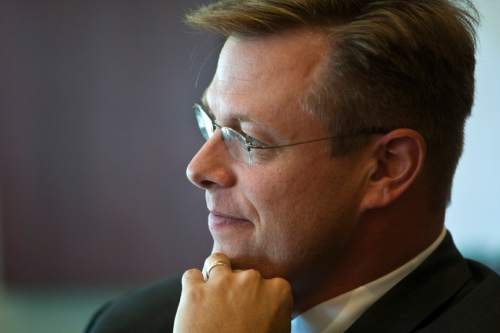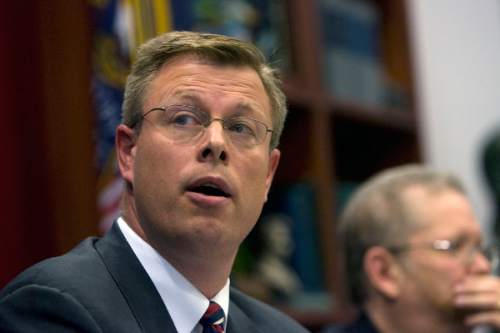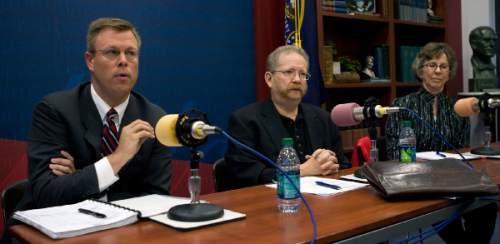This is an archived article that was published on sltrib.com in 2015, and information in the article may be outdated. It is provided only for personal research purposes and may not be reprinted.
Deseret News CEO Clark Gilbert, who oversaw a transformation of the newspaper as he championed faith-based coverage and a shift toward digital-centric news, has been named president of Brigham Young University-Idaho.
Gilbert is set to replace current President Kim Clark, who has led the Rexburg school since 2005. The Church of Jesus Christ of Latter-day Saints announced the appointment in a Tuesday statement on the church website. Apostle Russell M. Nelson also discussed the change Tuesday at BYU-Idaho's weekly devotional, the statement read.
Neither made clear what Clark will do upon leaving BYU-Idaho.
Gilbert's first day at the school, where he worked from 2006 to 2009 and oversaw online learning, is scheduled for April 13.
A spokesman for the church-owned university said Gilbert is likely to focus, among other things, on further expansion of BYU-Idaho's growing digital reach with students worldwide.
Gilbert did not respond to a request for comment.
In a short statement issued Tuesday, Gilbert's boss, Keith B. McMullin, praised his contribution to the LDS Church's various media properties, which include radio and TV outlets as well as the News.
"We appreciate the service Clark Gilbert gives the Deseret media companies," McMullin, president and CEO of Deseret Management Corp., said. "We are thrilled for Clark and his family, and for the BYU-Idaho students, faculty and administration."
The statement did not address Gilbert's successor at the News or if his departure signals any changes in direction for the newspaper.
Gilbert was an associate academic vice president at BYU-Idaho when he was hired as CEO of Deseret Digital Media in 2009. The Harvard University-educated executive assumed the helm at Deseret News Publishing Co., which manages the News, in May 2010.
Months later, he oversaw the layoffs of about 80 full- and part-time News employees — 43 percent of the paper's news staff — as part of a broader realignment at the LDS Church-owned daily in light of growing Internet audiences and declining print ad revenues.
Remaining News employees joined KSL-TV journalists in Salt Lake City's Triad Center. The paper also tightened its journalistic agenda to a set of faith-based topics such as family, education, care for the poor and values in popular media. Other beats once considered mainstays of its coverage — including business and municipal politics — were scaled back.
Gilbert also launched a national edition of the News and created Deseret Connect, a network of citizen freelance contributors.
Many of Gilbert's strategies drew on concepts of "disruptive innovation" driven by new technology, ideas developed by Harvard-based business leader Clayton Christensen. Gilbert's moves have drawn media attention within the news industry as its readership abandons print in favor of the Web and mobile devices.
He was a crucial player in the October 2013 rewriting of a longstanding business partnership between the News and The Salt Lake Tribune, Utah's largest daily. The new operating agreement has tilted revenue sharing and control of the two newspapers' joint advertising, printing and delivery operations decidedly in the News' favor, after years of Tribune dominance.
It also sold The Tribune's stake in shared printing facilities in West Valley City to the News.
Court documents filed last year indicate the deal was authored by Gilbert and John Paton, CEO of Digital First Media, which manages The Tribune and 75 other major dailies on behalf of a New York-based hedge fund, Alden Global Capital.
Gilbert and Paton have said the deal was designed to better position The Tribune as it transitions more fully to digital news-gathering and publishing.
Negotiated in exchange for a multimillion-dollar payment by the News to Digital First, the new terms of the News-Tribune partnership are under investigation by anti-monopoly lawyers at the U.S. Department of Justice and the Utah attorney general's office.
The deal also is being challenged in a federal lawsuit filed by a group of former Tribune employees and community members who claim it threatens to put The Tribune out of business.
Reached late Tuesday, Paton refused to comment on business dealings but said he admired Gilbert "for his work and diligence in trying to find a path for news organizations into the digital future."
"We don't agree 100 percent on everything," Paton said, "But we're agreed that radical action is needed in the news industry if it's going to survive."


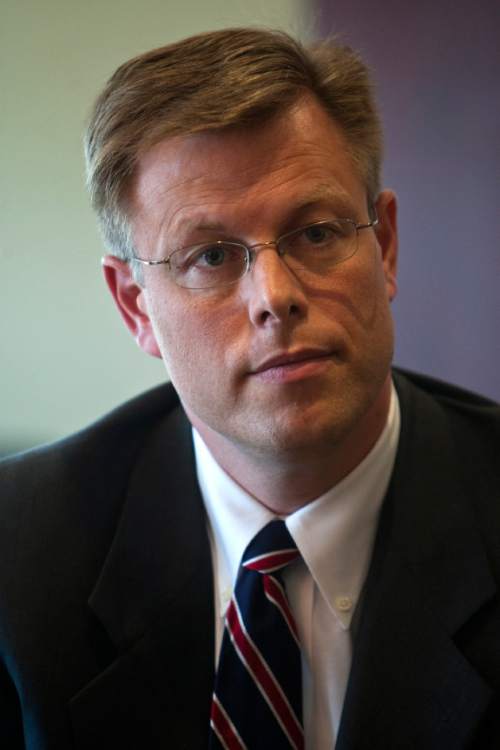
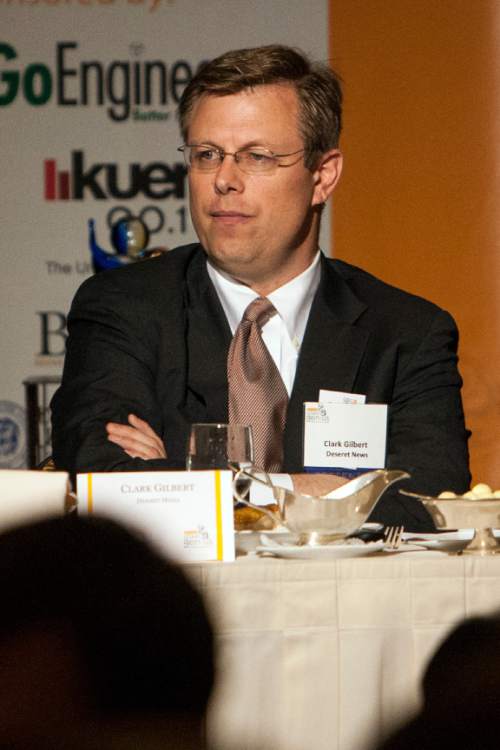
![Photo by Chris Detrick | The Salt Lake Tribune
"Nationally, people look at Deseret Connect as a pioneer in these efforts," said Deseret News CEO Clark Gilbert. "While we remain committed to our [professional] journalists, it's also naive to ignore the community for their voice, their talent and their insight. These are smart people and they love and live in our community so we will continue to invest in [them]."](https://archive.sltrib.com/images/2015/0127/Gilbert_012815~1.jpg)
